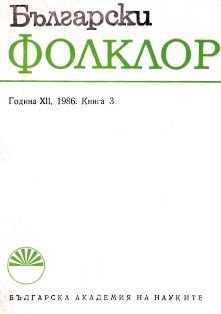Фолклорните явления в наши дни
Folklore Phenomena in Our Time
Author(s): Radost IvanovaSubject(s): Anthropology
Published by: Институт за етнология и фолклористика с Етнографски музей при БАН
Summary/Abstract: The article deals with certain contemporary folklore phenomena which are no part of the traditionally established conception of folklore. Pointing out the continuity of some feast days in the past and today, the author takes into consideration the role of social stereotypes in establishing present feast days expressive of new ideas and new meaning. Such are for instance the official holidays introduced or established by the socialist revolution in this country: May Day, a day of international solidarity of working people; May 24th, a day of Slavonic letters and of Bulgarian education and culture; etc. Another sphere where the movement, transmission and development of folklore stereotypes can be traced are the speech situations. It is pointed out that within the contexts of speech contacts one can still observe such traditional genres as proverbs, sayings, riddles, folktales, anecdotes, blessings, imprecations, curses, salutations, etc. They serve as models for the creation of new specimens of these genres which are widespread in every milieu. Particularly popular today are jokes, stories about actual happenings, rumours, hearsays, gossip. This view is supported by the citation of specimens from the folklore of workers and young people at schools and colleges. A new feature of the spread of folklore, the written form, is noted, which is not typical of traditional folklore. It is pointed out in conclusion that the new forms of folklore should be regarded as the products of essentially new social formations: the milieu or the set. With its intellectual or professional orientation, with its functions in society, the new social milieu, or set, is an important factor for the spiritual life of individuals. For their part, they create new folklore works which exhibit the folklore stereotypes but have new meaning and embody new ideas.
Journal: Български фолклор
- Issue Year: XII/1986
- Issue No: 3
- Page Range: 3-9
- Page Count: 7
- Language: Bulgarian
- Content File-PDF

